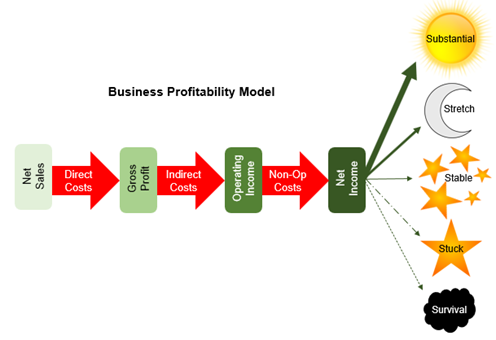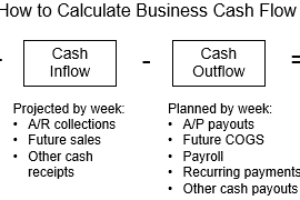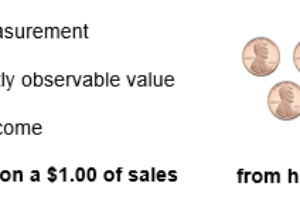Synopsis
Being accountable for results moves a person to ask what else they can do to achieve the results they are accountable for when indicators point that the result is likely to be missed. They recognize that it’s not enough to take action. It’s about taking the right actions at the right time. Rather than focusing on the tasks required to do a job, a manager who is accountable for results looks to results to be achieved, not the task.
A result is defined as the consequence, effect, or outcome of something or some action. Accountability means you are answerable for the results of actions and decisions. To hold someone accountable means the accountable person will be asked to explain why they did or didn’t do something they were accountable for doing.
In the purest form, you can only hold people accountable for their actions or inactions. You can’t hold them accountable for a result. The logic behind being accountable for action versus a result is that there are often multiple variables outside of an individual’s control through an action that can impact the result. While this is true for people who work for you, it isn’t true for the business owner.
Results matter more than actions to a business owner because the results of the business profitability model pay for the actions of you and your employees.

Business owners who hold themselves and their people accountable for results are likely to own substantial businesses. Those that don’t hold themselves or their people accountable for anything will always be found either in the survival stage or out of business. Click here to read more on the five stages of business profit progression. {P-1 Stages of business profitability}
Being accountable for results moves a person who has accountability to ask what else they can do to achieve the desired results when indicators exist that the result is likely to be missed. They recognize that it’s not enough to take action. It’s about taking the right actions at the right time. Rather than focusing on the tasks required to do a job, a person who is accountable for results looks to results to be achieved, not the task.
Being an accountable manager for results is more than meeting the minimal technical proficiency requirements and an understanding of job requirements. It is about defining your role by your ability to manage diverse individuals to perform consistently and reliably each day. You can easily recognize an accountable manager when you see them exhibit the following qualities:
- They possess emotional stability. An effective manager can control their temper under all conditions. Even when the going gets tough, they will follow an orderly, well-planned procedure that is flexible enough to permit necessary changes—all without coming unhinged.
- They are impartial and fair. An effective manager does not allow personal likes and dislikes to influence decisions.
- They are skilled in working with information. They can recognize patterns and trends in data and use them to make informed conclusions.
- They are open-minded and alert to new ideas. An open-minded person has greater flexibility in facing the varying situations that must be faced daily.
- They handle decision-making positively, quickly, and confidently. Anxious, shaky, and uncertain decisions cost indecisive managers the respect of other managers and subordinates.
- They understand the personalities of their subordinates to obtain the best work and cooperation from them. Subordinates must feel understood, and they must know they are under the steady and dependable direction of a manager they trust.
- They take advantage of opportunities to show the way, rather than merely dictating every move. Subordinates should feel that they are doing worthwhile work that they can see value in completing. This helps them to have a sense of accomplishment in their work.
- They communicate a feeling of confidence in their subordinate’s ability to do what’s asked. If a subordinate’s confidence is lacking, a competent manager must train that subordinate in their task correctly.
- They know when to praise and commend a subordinate for work well done and when to privately correct and discipline a subordinate for unsatisfactory work performance.
- They anticipate changes in the business environment. The best managers continuously scan the horizon and formulate proactive strategies to improve productivity. They don’t wait to be blindsided; instead, they take the initiative to discover what’s around the next corner so they can be ready when it comes.
Improving your accountability for results starts with knowing your profit plan targets
The discipline of personal accountability for results comes down to achieving defined goals within an established time frame. Step 3 of B-CPR involves monitoring the actual performance compared with planned performance through both leading and lagging metrics. The difference between actual and planned results is measured, and the causes contributing to these differences are identified. This allows corrective actions to occur sooner rather than later to eliminate or minimize the difference in results.
Neglect or unskilled handling of your profit plan variances will inevitably result in you losing control over your business. Every business will either move forward or regress as results change. Failure to monitor actions and measure results through each day, week, month, quarter, and year results in losing control over your business and your future. Failure to act is the number one cause of business cardiac arrest. Ultimately, this is the purpose of B-CPR Step 5—Be Accountable for Your Results.
What do you need to get better at?
If you aren’t clear on where your business needs the most improvement and where you need to step up your personal accountability in managing your business to higher profits and more consistent cash flow, click the link below to receive a free review of the three most important areas of improvement for your business.
Remember …
Understanding what results-based accountability is starts with embracing how a result is defined as the consequence, effect, or outcome of something or some action. Accountability is defined as being answerable for the results of actions and decisions. To hold someone accountable means the accountable person will be asked to explain why they did or didn’t do something they were accountable for doing.
Being accountable for results moves a person who has accountability to ask what else they can do to achieve the desired results when indicators exist that the result is likely to be missed. They recognize that it’s not enough to take action. It’s about taking the right actions at the right time. Rather than focusing on the tasks required to do a job, a person who is accountable for results looks to results to be achieved, not the task. This is why the most profitable businesses make their managers accountable for specific business results such as sales growth, gross profit, and operating profit.
If you are tired of making less money while work hard, watch this YouTube video on accountability to better appreciate why results-based accountability is important. You will see how the math associated with Net Sales and Net Income from the results-based accountability performance measure book ends. In this video you will see the impact of helping your employees accept greater personal accountability for the results of their actions will result in higher sales and profits. Being accountable for business results is the difference between healthy cash reserves and a business constantly scrambling for cash to meet payroll.
What do you need to get better at?
If you aren’t clear on where your business needs the most improvement and where you need to step up your personal accountability in managing your business to higher profits and more consistent cash flow, click the link below to receive a free review of the three most important areas of improvement for your business.
FREE ASSESSMENT

